Dynamics of regional governance : competition or complementarity between territories ?
2nd Lille Jean Monnet Workshop (2JML)
► Wednesday 7th December 2016
This workshop addresses the capacity building of regional authorities and articulation with other decision-making levels (States, metropolises, EU institutions). What place for regions in today's European multi-level governance system?
Registrations are closed!
PROGRAMME :
(click to download the programme in pdf)
-
9h00 : Opening and presentation



-
9h15 : From decentralisation to recentralisation in Central and Eastern Europe : case study Romania
Ioan Horga (Univ. Oradea, Chaire Jean Monnet, Romania)
(Click to see presentation)
In the Central and Eastern Europe, during the accession process and after they became members of the European Union the States played an important role in the process of decentralization at the local and the regional level. Although the process was not complete; in the context of the financial crisis, these States started to develop a recentralization process that decreased the competences of local and regional authorities. The paper argues that undeniably in the field of regional policy, the States from Central and Eastern Europe represent the most important partner of the European Commission to implement the regional policy. However, this role has different issues, coming from the particularity of each State from this region. The case of Romania has interesting particularities.
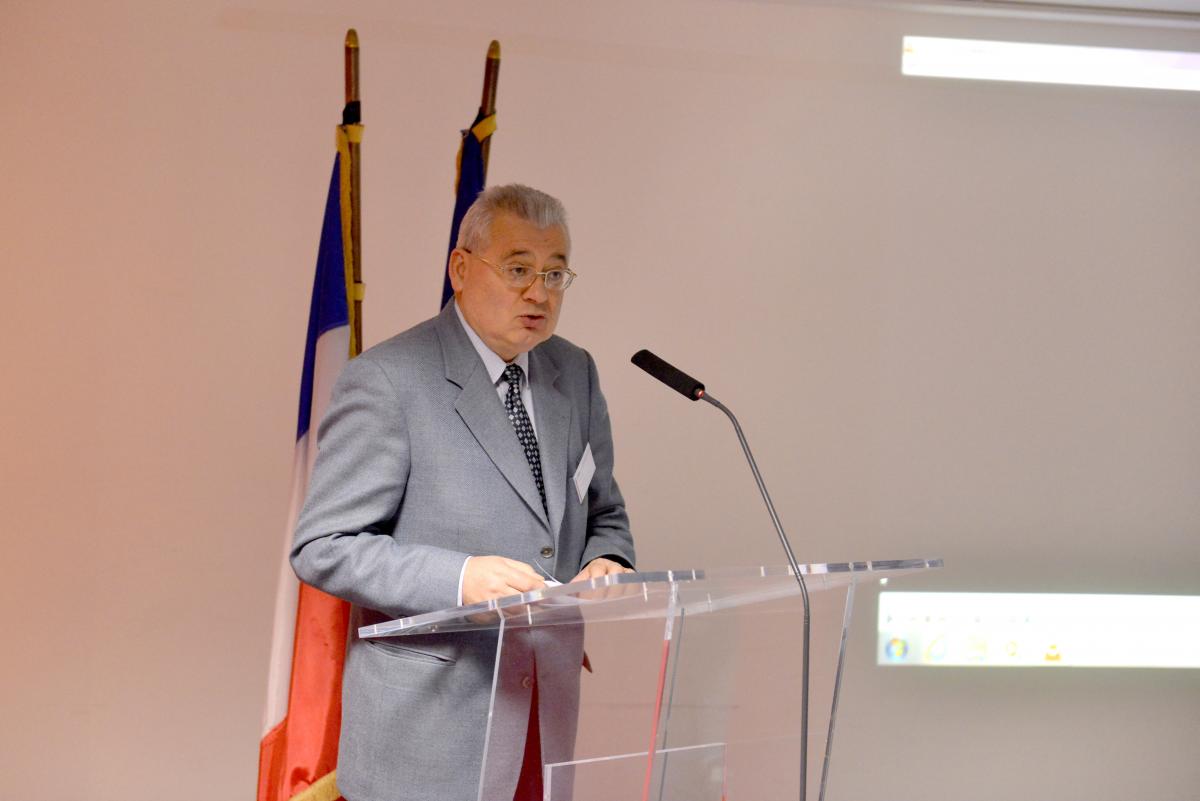
-
9h45 to 10h15 : City regionalism and regional development in England
Olivier Sykes (Univ. Liverpool, England)
(Click to see presentation)
From the 19th century onwards urbanisation strongly marked the development of Great Britain. A majority of the population was already concentrated into urban areas before the end of the century. In-keeping with trends in many countries structures of local government were reformed to progressively address the representative, economic, social and physical/environmental needs of expanding urban areas. Major reform in the 1970s introduced a scale of Metropolitan Counties in the largest English conurbations to address key strategic planning and development issues. However, these were abolished in the 1980s under the regime of Margaret Thatcher. In the 1990s and early 2000s regional development and spatial planning structures emerged at the scale of ‘standard regions’ larger than the metropolitan scale. Yet from the mid-2000s onwards the city-regional scale again rose to prominence in the work of researchers and through initiatives driven by local government cooperation in certain large metropolitan areas – notably Manchester. Since 2010 new structures called Combined Authorities have slowly emerged to oversee development at city-regional scale in a number of large conurbations. City regions have also been given prominence by state actions designed to address regional development disparities such as the so-called Northern Powerhouse initiative. This presentation will consider where the current wave of metropolitanisation initiatives fits into the history and trajectory of city and regional development in England and whether it represents a departure from previous approaches and models.
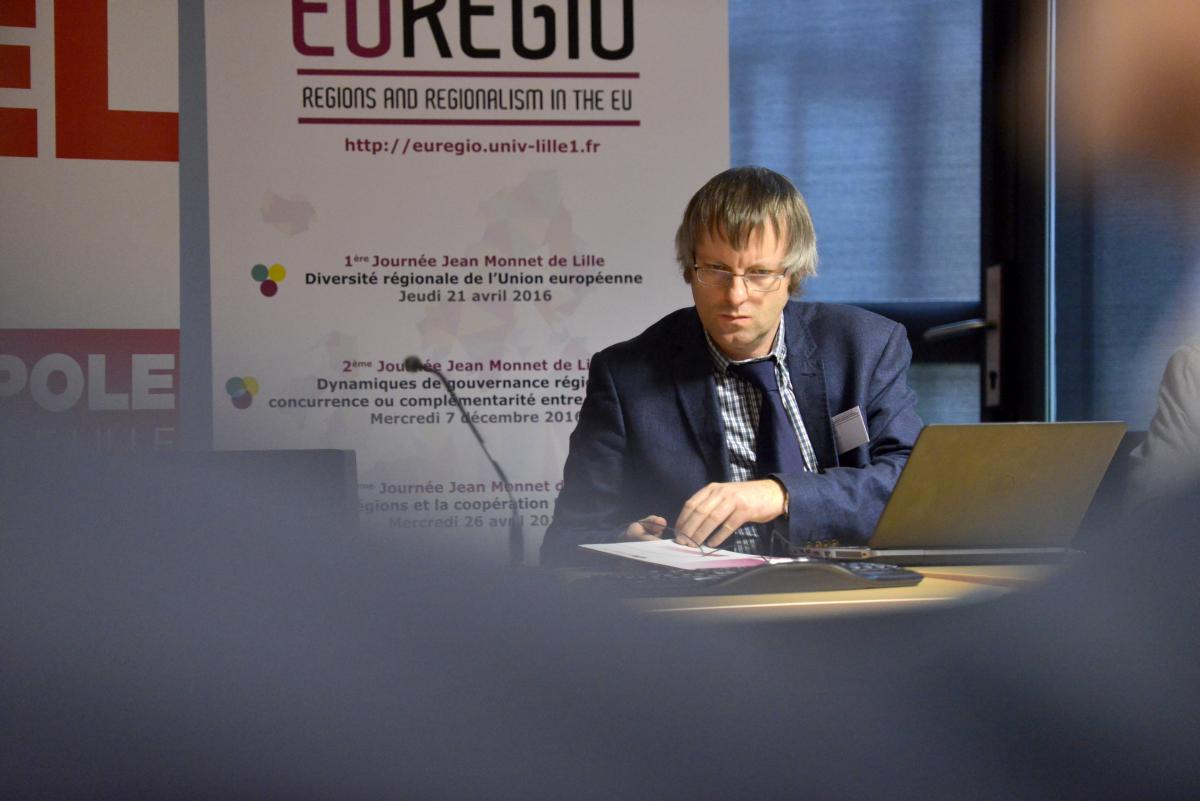
10h15 to 10h30 : Break
-
10h30 : The Federative Republic of Brazil : regions, regionalism and foreign policy
Marcelo De Almeida Medeiros (Federal Univ. Pernambouco, Recife, Brazil)
(Click to see presentation)
Composed of twenty-six states and a federal district, the Federative Republic of Brazil is a key Latin American player on the international scene. Its territorial dimension (sixteen times larger than France), natural resources and economic power make it a so-called emerging or potential superpower. Brazilian foreign policy historically adopted a Grotian approach, i.e, an international sociability rooted in cooperation and based on the Ius Gentium. Despite its linguistic specificity and an imperial political genesis, Brazil has always tried to keep good relationships with its South American neighbours. ALALC, ALADI and Mercosur are recent examples of this trend towards macro-regional cooperation, which shows a tendency of the federated States to assert their autonomy through active paradiplomacy.
-
11h to 12h30 : Discussion and debate
12h30 to 14h : Lunchbreak
-
14h-15h30 : Round table 1
Governance of Regional Planning : what dialogue(s) between territories?
Regional spaces gather many territorial entities acting on different scales, like for instance communes, groupings of communes, French départements or Belgian provinces. Regional authorities must then conduct their action in accordance with the other territorial authorities situated within the regional perimeter. The State can also be a crucial partner for regional policies. Relations between these authorities and bodies are differently regulated according to the different national socio-political contexts. This round table focuses on these questions, regarding in particular territorial planning development policies, with the participation of several professional stakeholders from different institutional backgrounds.
Participants:
- A representative of Region Hauts-de-France
- Rainer Wilking, European Planning Department, Land of North-Rhine-Westphalia (Click to see presentation)
- Joëlle Cottenye, Vice president of Département du Nord
- Jean-Cédric Delvainquière, Study Officer, Ministry of Culture and Communication
Chair : Thomas Perrin
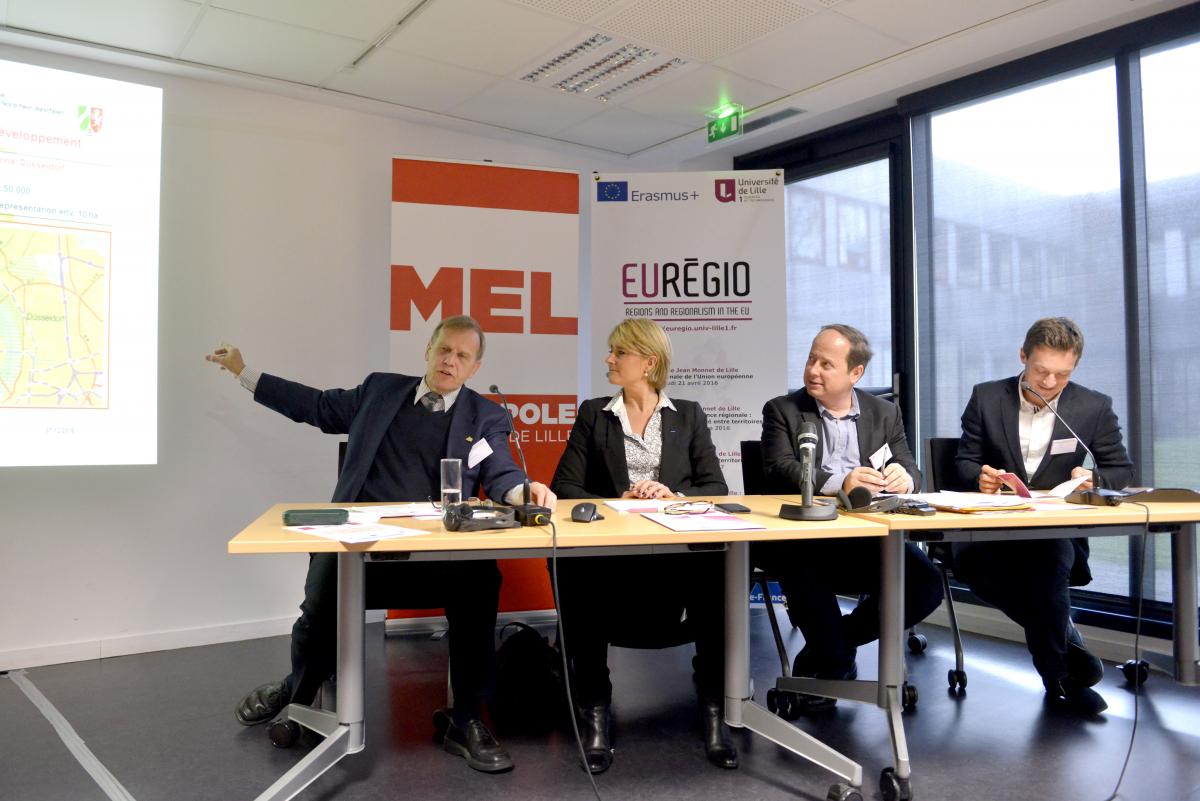
15h30 to 15h45 : Break
-
15h45 to 17h15 : Round Table 2
Regions and metropolises in Europe : a particular relationship?
Even though, as was shown during the first Lille Jean Monnet Workshop on April 2016, the forms and organisations of regionalisation prove to be very diverse from one European State to another, region and metropolis appear to be the two scales of reference for spatial planning and development policies in contemporary Europe. Nevertheless, the implementation and concrete impact of this increasing territorial dualism is far from being entirely measured. This round table addresses the question of articulation and synergy between regions and metropolises. It gathers professional and civil stakeholders from different metropolitan regions in Europe.
Participants:
- Alberto Leboreiro Amaro, General Sub-Director of Regional Planning, Autonomous Community of Madrid (Click to see presentation)
- Marjolein Stamsnijder, Officer, Metropoolregio Amsterdam
- Geert De Roep, Officer, Brussels-Capital Region (Click to see presentation)
- Jean-Marie Ernecq, Vice-President of the Civil Forum of Eurométropole Lille-Courtrai-Tournai
Chair : François-Olivier Seys
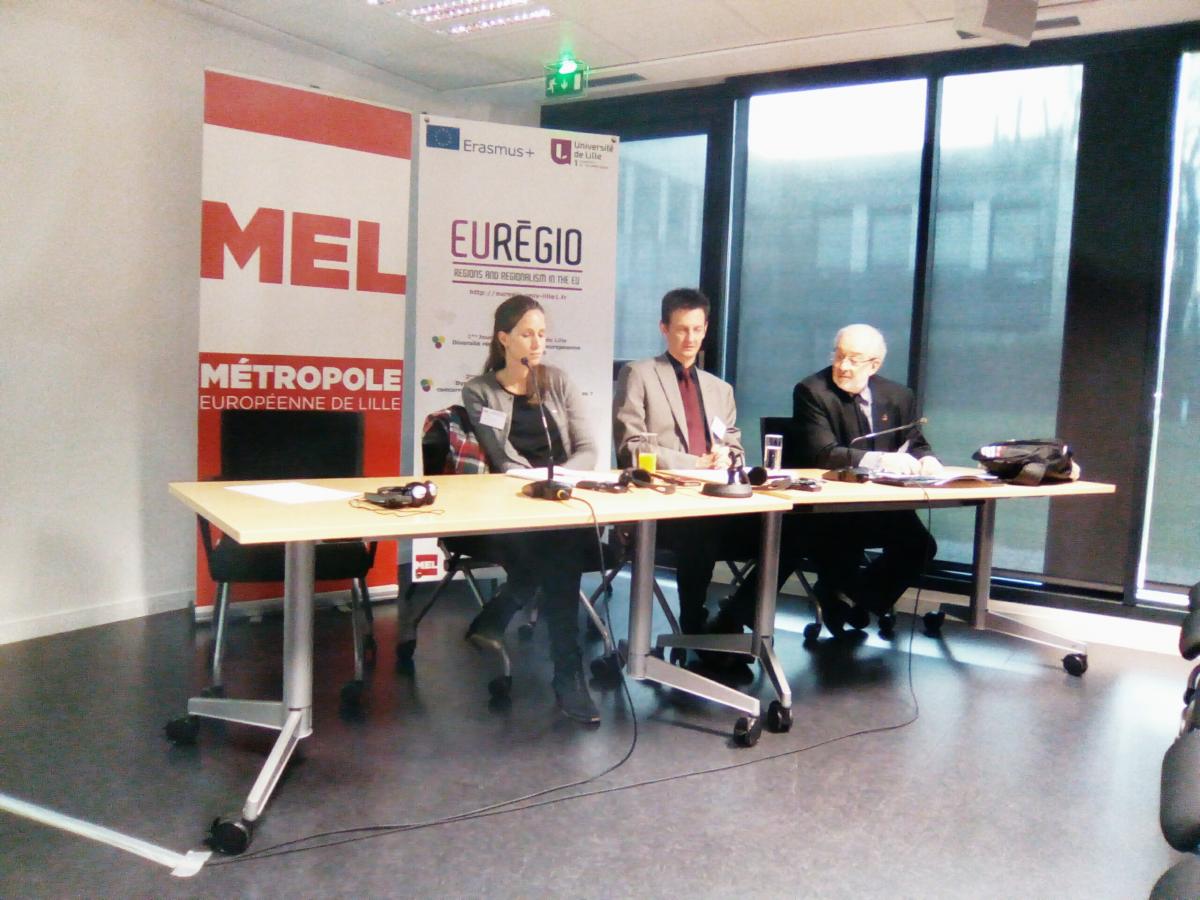
17h15 to 17h30 : Break
-
17h30 to 17h45 : Presentation of the Jean Monnet student workshop : Regional identities and policies in Europe (Click to see presentation)
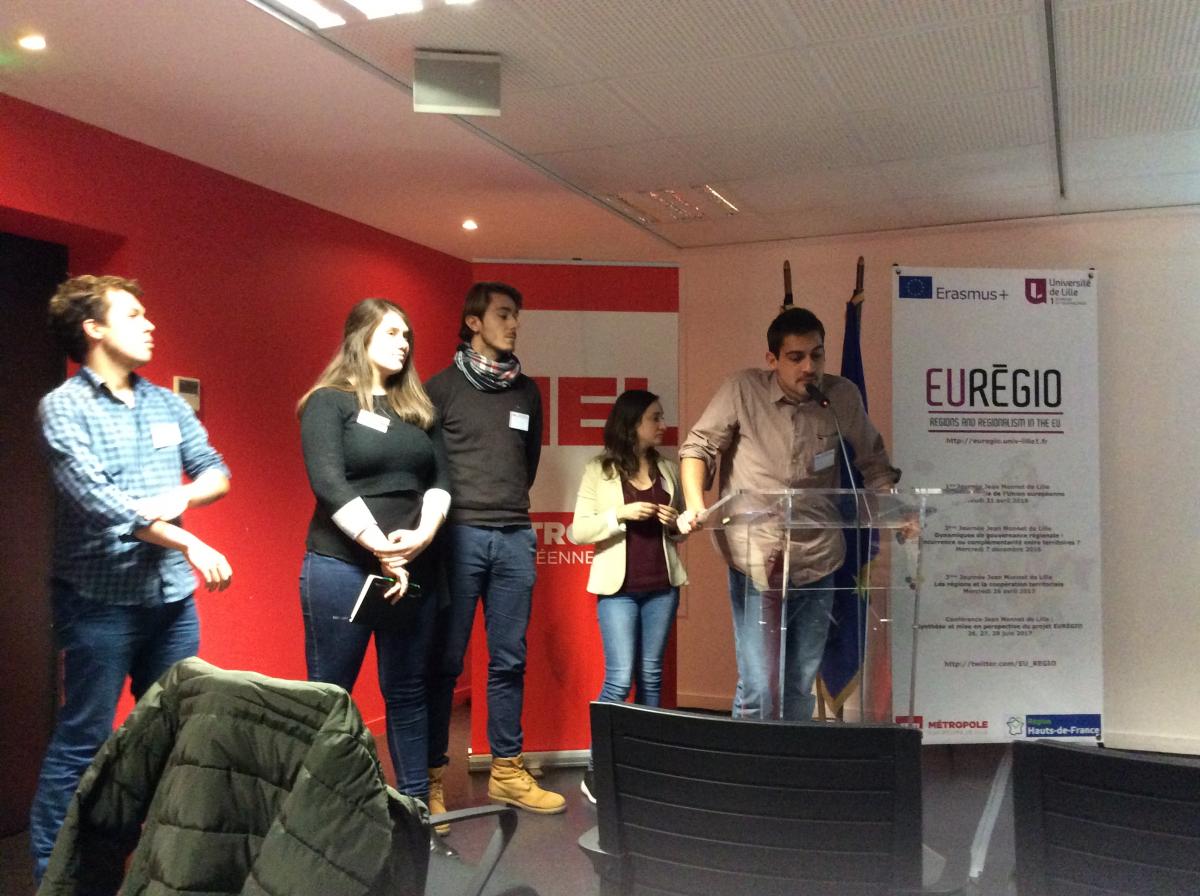
-
17h45 : Closing and announcement of the next Lille Jean Monnet Workshop (Wednesday 26th April 2017)
PLACE :
European Metropolis of Lille
Métropole Européenne de Lille,
1 rue du Ballon,
59034 LILLE
Please contact Elsa Delfort for further information



